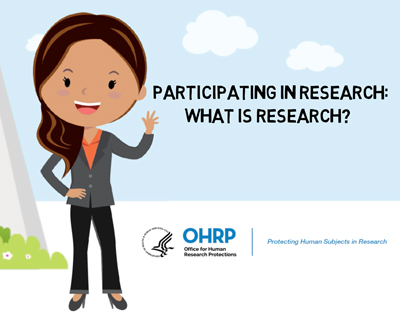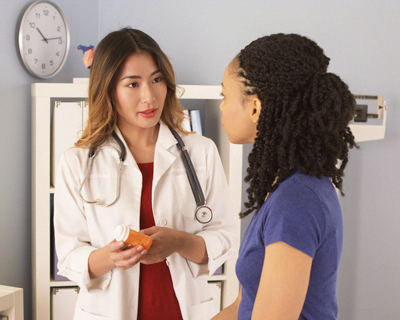Feature Story
Help All of Us Reach Your Community
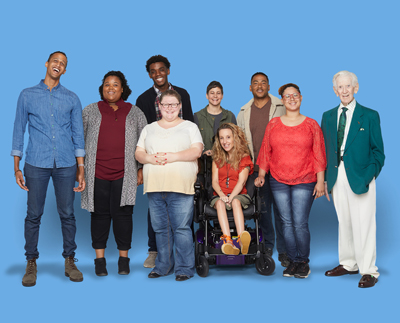 We are calling on national, regional and local organizations to become partners in the All of Us program. The goal of this unprecedented effort is to create the largest publicly accessible database ever by gathering data on more than one million Americans to help find cures and better treatments for a wide range of conditions. Learn more, and encourage members of your community to participate. You will help researchers acquire practical insight about different diseases.
We are calling on national, regional and local organizations to become partners in the All of Us program. The goal of this unprecedented effort is to create the largest publicly accessible database ever by gathering data on more than one million Americans to help find cures and better treatments for a wide range of conditions. Learn more, and encourage members of your community to participate. You will help researchers acquire practical insight about different diseases.
By understanding people’s health, ethnicities, neighborhoods, families and lifestyles, researchers will have information to better understand health and disease. This information is essential for creating a healthier future for generations to come. You can help ensure that All of Us advances health for all populations.
If you don’t know where to start, check out the Community Engagement Toolkit. It offers a number of ways for you or your organization to help spread the word. The toolkit contains free downloadable materials, including FAQs, brochures and videos, to help community members spread the word about the program. Many of the materials are available in both English and Spanish.
News and Events
April Is National Minority Health Month
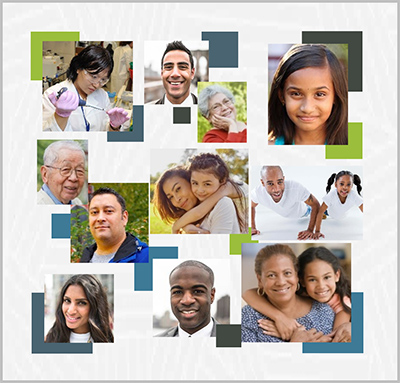 There are various health disparities that affect specific minority and ethnic groups more than others. For example, some diseases, such as lupus, affect blacks/African Americans, Hispanics/Latinos, Asians and American Indians/Alaska Natives more than whites. Join us in raising public awareness of these disparities by sharing reliable health information with your community to help them learn about and manage these conditions.
There are various health disparities that affect specific minority and ethnic groups more than others. For example, some diseases, such as lupus, affect blacks/African Americans, Hispanics/Latinos, Asians and American Indians/Alaska Natives more than whites. Join us in raising public awareness of these disparities by sharing reliable health information with your community to help them learn about and manage these conditions.
Featured Resources
 Are you planning outreach efforts or community events? The resources below can be found on our Community Outreach Initiative site and can help you educate your patients and community members about bone, joint, muscle and skin health.
Are you planning outreach efforts or community events? The resources below can be found on our Community Outreach Initiative site and can help you educate your patients and community members about bone, joint, muscle and skin health.
Tools To Explain Clinical Research
Do members of your community have questions or concerns about clinical research? They are not alone. Here are a few useful tools that provide basic information about clinical trials so that potential volunteers can make informed decisions about participating in research. Some of the resources are also available in Spanish.
- NIAMS Community Outreach Initiative Clinical Research Page
- Why Should I Participate in a Clinical Trial?
- Video Series: Participating in Research
Navigating Clinical Trials
Explore ClinicalTrials.gov to find federally and privately supported clinical trials around the world that are investigating a range of diseases from musculoskeletal, rheumatic and skin conditions to cancer, infectious diseases and neurological disorders. Here are some resources to make your search easier.
Your Healthiest Self: Wellness Toolkits
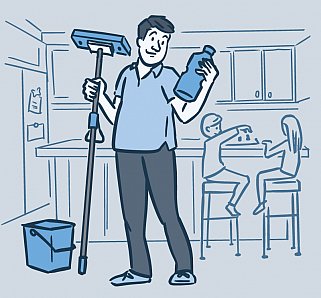 Every community is unique, and each person’s “healthiest self” is different. We have different bodies, minds, living situations and people influencing our lives. Each area can impact overall health. This means that we each have a unique set of health needs. Use these wellness toolkits to help yourself and others to improve well-being in different areas.
Every community is unique, and each person’s “healthiest self” is different. We have different bodies, minds, living situations and people influencing our lives. Each area can impact overall health. This means that we each have a unique set of health needs. Use these wellness toolkits to help yourself and others to improve well-being in different areas.
New E-Newsletter! Women’s Health in Focus at NIH
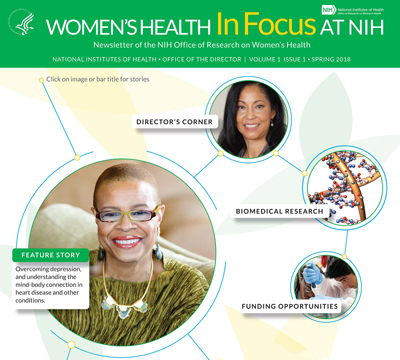 This new electronic publication from the NIH Office of Research on Women’s Health (ORWH) provides updates on women’s health research being performed across NIH Institutes and Centers, highlights relevant scientific advances, provides content of interest to women in biomedical careers, describes recent and forthcoming ORWH activities and announces funding opportunities for research on sex differences and women’s health. The feature story in the inaugural issue explores the holistic, mind-body connections among depression and chronic conditions like diabetes and heart disease, especially as they relate to women. Go to the bottom of this page to subscribe.
This new electronic publication from the NIH Office of Research on Women’s Health (ORWH) provides updates on women’s health research being performed across NIH Institutes and Centers, highlights relevant scientific advances, provides content of interest to women in biomedical careers, describes recent and forthcoming ORWH activities and announces funding opportunities for research on sex differences and women’s health. The feature story in the inaugural issue explores the holistic, mind-body connections among depression and chronic conditions like diabetes and heart disease, especially as they relate to women. Go to the bottom of this page to subscribe.

